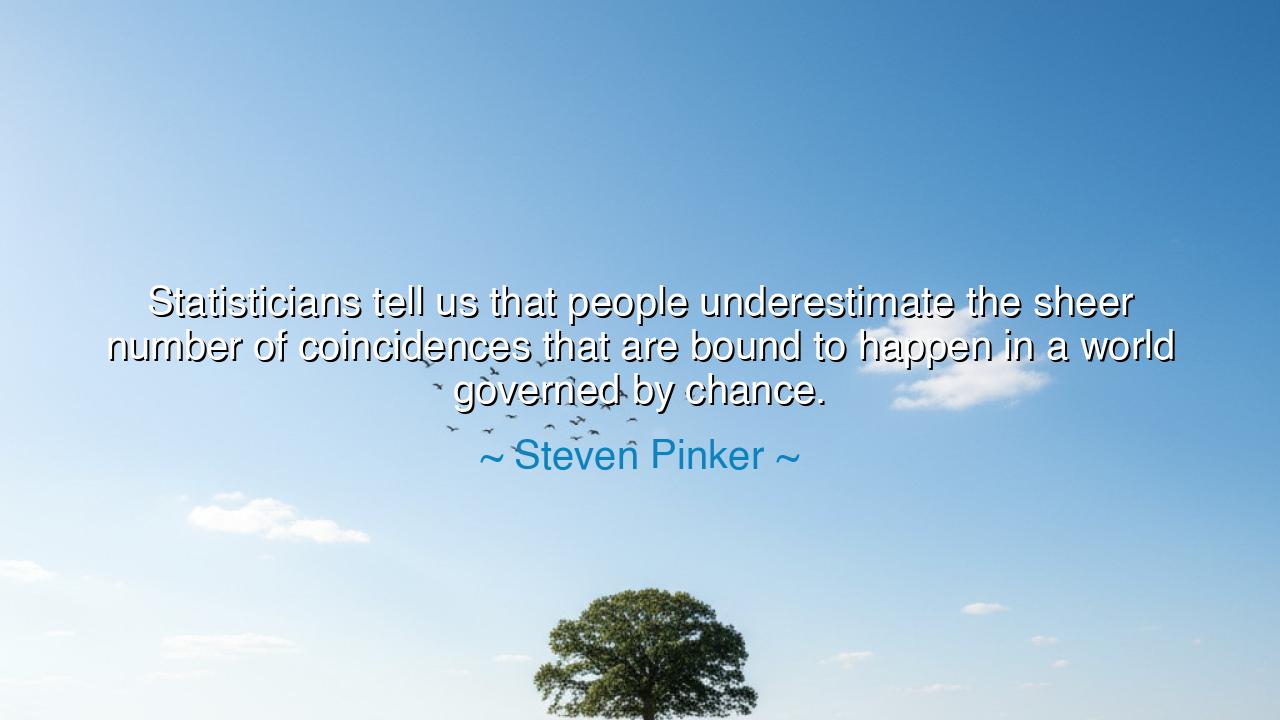
Statisticians tell us that people underestimate the sheer number
Statisticians tell us that people underestimate the sheer number of coincidences that are bound to happen in a world governed by chance.






In the vast and ever-changing dance of the universe, where chaos and order intertwine, there is a profound truth that lies hidden within the seemingly trivial moments of our lives. Steven Pinker speaks to this truth when he says, “Statisticians tell us that people underestimate the sheer number of coincidences that are bound to happen in a world governed by chance.” These words reveal a simple yet powerful reality: the world we inhabit is ruled not by a fixed, rigid fate, but by the ebb and flow of chance, where the improbable becomes inevitable over time. Coincidences, those moments when events seem to align against all odds, are not merely the result of mystical forces, but the natural outcome of a world governed by probability and randomness.
At first glance, coincidences may seem like miracles or signs of a deeper meaning at work. How often have we marveled at an encounter or event that seemed so unlikely, so perfectly timed, that it felt as if fate itself had intervened? And yet, Pinker’s words remind us that what we often call coincidence is simply the result of countless variables in a vast, interconnected world. The ancient Greeks, in their search for order and meaning, believed in the concept of chance as a force that could not be understood or controlled, but rather observed and accepted. In their minds, the gods played a role in guiding fate, yet chance was always present, lurking beneath the surface, guiding the flow of events with an invisible hand. Today, we have come to understand that it is not the gods, but the natural forces of randomness that shape our lives, and that the unexpected events we witness are simply the result of complex systems at work.
Consider, for instance, the story of Sir Isaac Newton, whose great work in mathematics and physics arose not from a preordained path, but from a series of chance occurrences and the application of seemingly unrelated ideas. Newton’s discovery of the law of gravity is often told as a moment of sudden genius, but in truth, it was the result of a series of coincidences — his thoughts on motion, the fall of an apple, the study of planetary orbits — that coalesced over time. This moment of insight, which changed the course of science, was not a singular event, but the culmination of countless random influences and experiences that came together at the right moment. Newton’s life was shaped by the intersection of chance and dedication, a reminder that even in the most monumental achievements, there is an element of randomness that must be embraced.
The ancient philosophers, too, understood the role of chance in shaping human affairs. The Stoics, in particular, taught that while we cannot control the external world, we can control how we respond to it. Epictetus famously said, “It is not what happens to you, but how you react to it that matters.” This speaks to the ancient understanding that life is unpredictable, full of coincidences and unexpected turns, and that true wisdom lies in accepting these moments with grace and understanding. The Stoics taught that the key to living a virtuous life was not to fight against the world’s randomness, but to embrace it, to accept that much of life is beyond our control, and to focus on our ability to choose our response.
In modern times, we have come to understand that chance governs much of what happens in the world, from the formation of galaxies to the paths of individual lives. Pinker’s insights into the nature of coincidences help us see that what we perceive as remarkable or improbable is often the result of statistical forces at play. Yet, this realization should not diminish the beauty or mystery of life, but rather enhance it. When we acknowledge that coincidences are the inevitable product of a world governed by probability, we can begin to see the world in a new light, one where the unexpected moments that shape our lives are not random or meaningless, but the natural outcome of a vast, interconnected system.
The lesson here is both humbling and empowering. It reminds us that life is not a carefully orchestrated plan, but a series of random events, each one linked to the next by a web of unpredictable forces. Chance is not an enemy to be feared, but a force to be understood and embraced. We must learn to see the beauty in coincidences, to recognize that every unexpected event is part of a much larger story, and that we, too, are shaped by the chance encounters and decisions that arise throughout our lives.
So, let us take heed of Pinker’s wisdom: accept the randomness of life and understand that each moment, no matter how coincidental, is part of the greater pattern of existence. Let us embrace the unexpected, and instead of seeking to control the chaos around us, let us adapt to it, knowing that in the grand tapestry of life, chance plays a greater role than we may ever fully understand. And in doing so, we may find that the very coincidences we once marveled at are simply the natural rhythms of a world in which all things are interconnected, shaped by forces beyond our understanding. Trust in the flow, for even in randomness, there is a certain order, and in the unexpected, there is often profound meaning.






AAdministratorAdministrator
Welcome, honored guests. Please leave a comment, we will respond soon